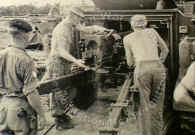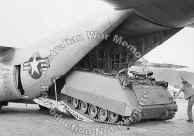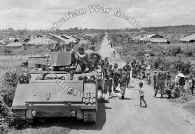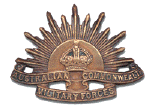The 4th/19th Prince of Wales’s Light Horse has a long
and proud history. As the name implies, the origin of the
Regiment is in 3 separate organizations, the 17th Prince of
Wales’s Light Horse, the 19th Yarrowee Light Horse and the 4th
(Ex 20th) Corangamite Light Horse. The amalgamation which
occurred in 1948 is a relatively recent change in the history of
the three Regiments.
 |
 |
 |
|
Bien Hoa, South Vietnam,
1965-08-18. Gunners of 161
Field Battery Royal New Zealand Artillery,
manhandle a 105mm l5 pack howitzer into a M113 of 1 APC troop, Prince of Wales
Light Horse, as the battery prepares to move to a
temporary firing position six kilometres north of Bien Hoa airbase. The
guns of 161 Fd Bty were carried to the firing site inside APC's
to conceal the nature of the operation. This was the first
occasion that the l5's of 161 Fd Bty were carried inside APC's.
(donor H M. Lander) |
Vung
Tau, Vietnam. 1965.
An
M113 APC of the 4/19th Prince of Wales Light Horse
Regiment moves up the loading ramp of a US C130 Hercules
aircraft to be airlifted to Bien Hoa airbase twenty miles
from Saigon
|
Bien
Hoa, Vietnam. 1965-08.
An
M113 Armoured Personnel Carrier from 4/19th Prince of
Wales Light Horse, a detachment from which is operating in
support of 1st Battalion, The Royal Australian Regiment
(1RAR).
It is on a main road at the entrance to a village,
possibly Ong Huong.
|
Like many of Australia’s proudest Regiments, the 17th
Light Horse was raised as part of the volunteer movement which
began during the Crimean War. On the first of October 1860 one
of the first Victorian Mounted units was raised, the Kyneton
District Mounted Rifle Corps, which was to form part of the
Royal Volunteer Cavalry Regiment. This unit was granted the
title “Prince of Wales’s” in 1862. The unit badge at this
time was based on the Prince of Wales’s personal crest and
together with the motto “Ich Dien” (I serve), the ostrich
plumes have survived to be the basis of the Regiment’s badge
today.
In common with the 17th Light Horse, the 19th Light Horse
descends from the Royal Volunteer Cavalry Regiment and also has
suffered many changes in name and in role. By 1885 the Victorian
Mounted Rifles had
been raised and members of this unit went to South Africa. There
was no 17th or 19th Light Horse in the 1st AIF, however in
recognition of the service of the men of these units in South
Africa and the Great War, both have been granted battle honours
for South Africa, Gallipoli, Egypt and Palestine.
The record of the 4th Light Horse in the 1914-18 war is
without equal in the AIF. It was the only Australian unit to see
service on all three fronts, France, Gallipoli and Palestine and
was granted a total of 24 Battle Honours of which only 10 can be
carried on the guidon. Probably the most notable action of the
4th Light Horse was the Charge at Beersheba on 30 October, 1917,
an action which is commemorated each year by the serving
soldiers of the Regiment.
For most of the Second World War the three Regiments
served in Australia under various other Regimental titles as
home troops. Only the 2nd/4th Armoured Regiment, which is deemed
to be the successor of the 4th Light Horse from the 1st AIF, saw
active service late in the war.
When the Citizens Military Forces were reformed in 1948
it was decided to perpetuate the traditions of the 4th Light
Horse, the 17th Prince of Wales’s Light Horse and the 19th
Light Horse. During the Vietnam conflict the first Australian
Armoured Corps troops into action in the mid 60’s were from 1
APC Troop which was formed from A Sqn, 4th/19th Prince of
Wales’s Light Horse.
-
Today the Regiment is based in Melbourne and has two
sabre squadrons, one in Gippsland and one in Melbourne, with a
troop in Kyneton. The regiment is proud to have been granted the
Freedom of Entry to 4 cities of
-
Melbourne,
-
Kyneton,
-
Traralgon
and
-
Sale.
|
